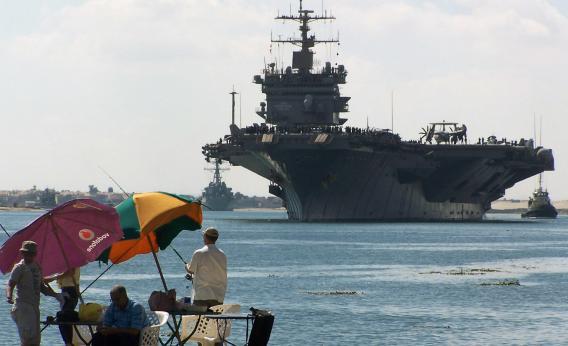October, month of surprises: We have come to expect the unexpected.
Whether it’s Black Tuesday (the Wall Street crash of Oct. 29, 1929), news of an impending deal to end a long, unpopular war (Henry Kissinger, “peace is at hand” in Vietnam, Oct. 26, 1972), or just the unlikely revival of a team with a well deserved reputation for choking (Boston Red Sox, October 2004), the term “October Surprise” has entered the dictionary, and rightfully so.
This year, the question hanging over the contest between Republican challenger Mitt Romney and President Barack Obama is particularly poignant: Will Israel strike at Iran’s nuclear program before the election? That scenario, Republican advisers fear, could result in an election eve surge of support for the sitting president by 5 to 7 points — the traditional reaction when US forces gird for possible action.
Republicans today are white hot about what some claim as yet another example of the October surprise phenomenon: the October 5 Labor Department revision to unemployment figures that tugged them conveniently down (for President Obama, at least) from 8.1 to 7.8 percent.
But the results of an Israeli decision to strike Iran between now and Nov. 6 would not only deal a potentially fatal blow to Mitt Romney’s presidential ambitions; it could also tip the entire world into something economists universally fear: a coordinated global recession prompted by a huge spike in global oil prices.
Robert McNally, who was senior international energy advisor in the White House’s National Security Council during the last administration, says a dangerous gap has developed between what he calls “planet officialdom” and “planet market” on the likelihood of an Israeli strike in the very near future.
In effect, McNally says, past experience — the Gulf War and more recent Iraq War — has convinced oil traders and other market players whose activities move prices that the US military would quickly restore the flow of oil through the Strait of Hormuz should Iran take steps to interrupt that narrow channel, through which 17 million barrels of oil move per day, or 17 percent of all “sea-traded” oil.
But a decade of war games by US Navy planners have showed that is not a given. According to a source at the US Naval War College in Newport, Rhode Island, who asked to remain anonymous due to the sensitive nature of the information, several recent simulations showed it could take up to a month to re-open the Strait, and that Iran could inflict significant damage to US naval vessels attempting to do so.
There’s another problem: the vast majority of so-called “surplus capacity” — the extra production-ready capacity to increase global supply — lies north of Hormuz in Saudi Arabia and other Gulf facilities. For years, Western efforts to prevent a catastrophic increase in energy prices as result of a Persian Gulf crisis have relied on two levers: surplus Saudi production capacity, and release from US and European strategic petroleum reserves (SPRs).
Those two elements appeared to meet economists’ definition of an effective counterbalance to a panicked, supply starved market: the ability to replace up to 5 percent of global demand within 30 days and sustain it for 90 days.
